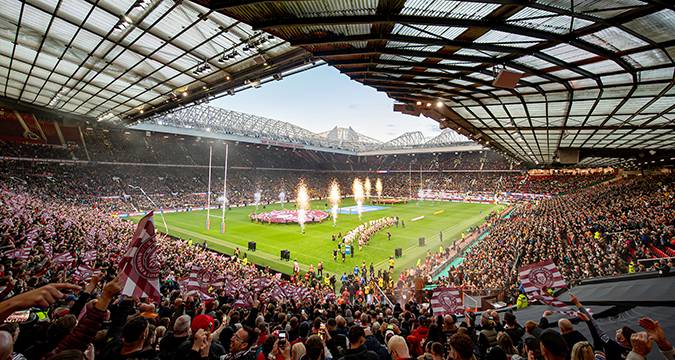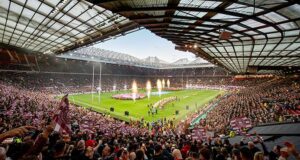
“Manchester United’s Bold Move: Demolishing Old Trafford for a £3 Billion Stadium Revolution”
In a bold and unprecedented move, the new owner of Manchester United, Sir Jim Ratcliffe, has unveiled ambitious plans to demolish the iconic Old Trafford stadium and replace it with a cutting-edge £3 billion venue. This monumental decision signals a seismic shift in the landscape of football stadiums, with implications reaching far beyond the boundaries of Manchester.
Gone are the days of incremental renovations; Ratcliffe envisions nothing short of a revolution in the footballing world. Dubbed the “Wembley of the North,” the proposed stadium aims to rival the grandeur and spectacle of its southern counterpart. This audacious undertaking represents a departure from the previous strategy of a £1 billion redevelopment, demonstrating Ratcliffe’s determination to leave an indelible mark on the sporting world.

Picture by Allan McKenzie/SWpix.com – 14/10/2023 – Rugby League – Betfred Super League Grand Final – Wigan Warriors v Catalans Dragons – Old Trafford, Manchester, England – A general view (GV) of Wigan and Catalans coming out to the field of play in the Betfred Super League Grand Final.
The proposed location for the new stadium remains in the vicinity of the existing Old Trafford site, promising continuity while ushering in a new era of innovation and progress. However, the transition period poses logistical challenges, particularly for events like the Super League Grand Final, which will need to find alternative venues during construction.
To spearhead this ambitious project, Ratcliffe has assembled a formidable team in the form of the ‘Old Trafford Regeneration Task Force.’ Chaired by the esteemed Lord Sebastian Coe and featuring luminaries such as former Manchester United captain Gary Neville and Mayor of Greater Manchester Andy Burnham, this task force embodies a commitment to excellence and community engagement.
“The north-west of England has a greater concentration of major football clubs than anywhere else in the world, yet we don’t have a stadium on the scale of Wembley, the Nou Camp, or Bernabéu,” Ratcliffe declares, underscoring the magnitude of the endeavor. “We will not be able to change that on our own, which is why this task force is so important to help us seize this once-in-a-century opportunity.”
While the prospect of bidding farewell to Old Trafford may evoke nostalgia among fans, the promise of a state-of-the-art venue heralds a new chapter in Manchester United’s storied history. Moreover, this initiative extends beyond mere sporting ambitions, with Lord Coe emphasizing the potential for stadiums to serve as catalysts for social and economic development.
“Throughout my career in sport, I have seen the potential for stadiums to become focal points for strong communities and catalysts for social and economic development,” Lord Coe asserts, drawing parallels with his experience in the 2012 Olympics. “That was certainly true of the venues we built in east London, and we are overdue a project of similar scale and ambition in the north of England.”

Picture by Allan McKenzie/SWpix.com – 14/10/2023 – Rugby League – Betfred Super League Grand Final – Wigan Warriors v Catalans Dragons – Old Trafford, Manchester, England – A general view (GV) of Wigan and Catalans coming out to the field of play in the Betfred Super League Grand Final.
As discussions unfold and plans materialize, the footballing world eagerly anticipates the realization of Ratcliffe’s vision. With venues in Newcastle and Manchester already vying for the opportunity to host the Super League Grand Final, the stage is set for a transformative journey that transcends sport and leaves an indelible mark on the fabric of society.
In the face of uncertainty and change, one thing remains certain: Manchester United’s bold move to demolish Old Trafford signals the dawn of a new era, defined by innovation, ambition, and a steadfast commitment to excellence.
Leave a Reply